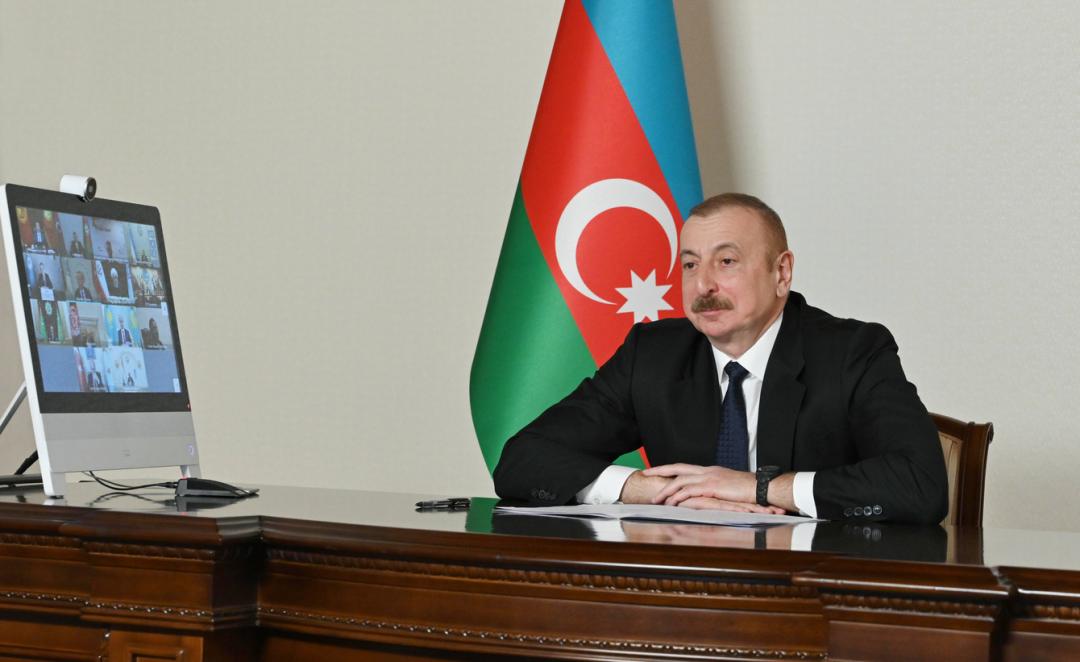
Azerbaijan's Aliyev Declares De-facto Peace with Armenia, Calls for Formal Treaty

On February 1, Ilham Aliyev, the President of the Republic of Azerbaijan, received Secretary General of the Inter-Parliamentary Union Martin Chungong, the Press Office of the Azerbaijani President reported.
The President of Azerbaijan said that the congratulatory message sent by the Armenian leadership on the occasion of the independence of the so-called Republic of Nagorno-Karabakh on September 2 last year, as well as the so-called presidential elections held on September 9, totally undermined the peace process, emphasizing that Azerbaijan resorted to anti-terrorism measures to ensure its territorial integrity and sovereignty.
The head of state underlined that there is already de facto peace between Azerbaijan and Armenia, and a state of peace has prevailed along the border of the two countries for several months. "Yet, to deliver a logical conclusion to this process, a peace treaty must be signed, and Armenia's territorial claims against Azerbaijan must be brought to an end," he added.
President Ilham Aliyev noted that in Armenia's Declaration of Independence, there are direct calls for the annexation of Azerbaijan's Karabakh region to Armenia and the violation of Azerbaijan's territorial integrity, and this document is also referred to in the Constitution of Armenia. "Furthermore, in Armenia’s other regulatory and legal documents, there are numerous provisions that assert territorial claims against Azerbaijan, and in many conventions and other documents to which Armenia is a party, there are numerous clauses that do not recognize Azerbaijan's sovereignty over Karabakh," the Azerbaijani leader said.
In addition, the head of state emphasized that the basis of Armenia's claims against Azerbaijan in international courts consists of issues such as the non-recognition of Azerbaijan's sovereignty and territorial integrity by Armenia, as well as the separation of Karabakh from Azerbaijan. The President of Azerbaijan noted that peace can be achieved when these claims are brought to an end and when amendments are made to the Constitution of Armenia and other regulatory and legal documents. Stressing the importance of expeditiously implementing this in Armenia, the head of state underscored that initiating internal discussions on this issue in Armenia is considered a positive step, adding that this could create good opportunities for expediting the conclusion of the peace process.
Saying that France is carrying out a destructive policy in the region, acting on the principle of adding fuel to the fire, pursuing a policy of Armenia's militarization, and instigating geopolitical intrigues, President Ilham Aliyev noted that official Paris is the cause for the tension in the region. The President also noted that France conducts anti-Azerbaijan policy within various international organizations and at the parliamentary levels. The head of state underscored that France pursues aims to achieve a leading position and strengthen its influence in the South Caucasus region. However, he added that their efforts in this direction have been futile.
President Ilham Aliyev stressed that the efforts of a minority group in the Parliamentary Assembly of the Council of Europe, which is anti-Azerbaijani in nature and opposes the ratification of the credentials of the Azerbaijani delegation, did not contribute to the dialogue. He stated that this contradicts the traditions of parliamentary platforms in general. The head of state emphasized the importance of restoring the rights of the Azerbaijani delegation and pointed out that if the rights of the Azerbaijani delegation are not restored, Azerbaijan will reconsider its participation in the Council of Europe and the European Court of Human Rights.
Martin Chungong proposed that the Inter-Parliamentary Union could be a platform for dialogue between the parliamentarians of Armenia and Azerbaijan.
See Also


Armenia Records 5.9% GDP Growth in 2024, Missing 7% Goal

Yerevan Balances Strategic Ties with Both US and Russia, Says Foreign Minister

FM Mirzoyan: Peace Deal with Azerbaijan Is Within Reach

Pashinyan and Erdogan Hold Call, Reaffirm Commitment to Ongoing Dialogue

